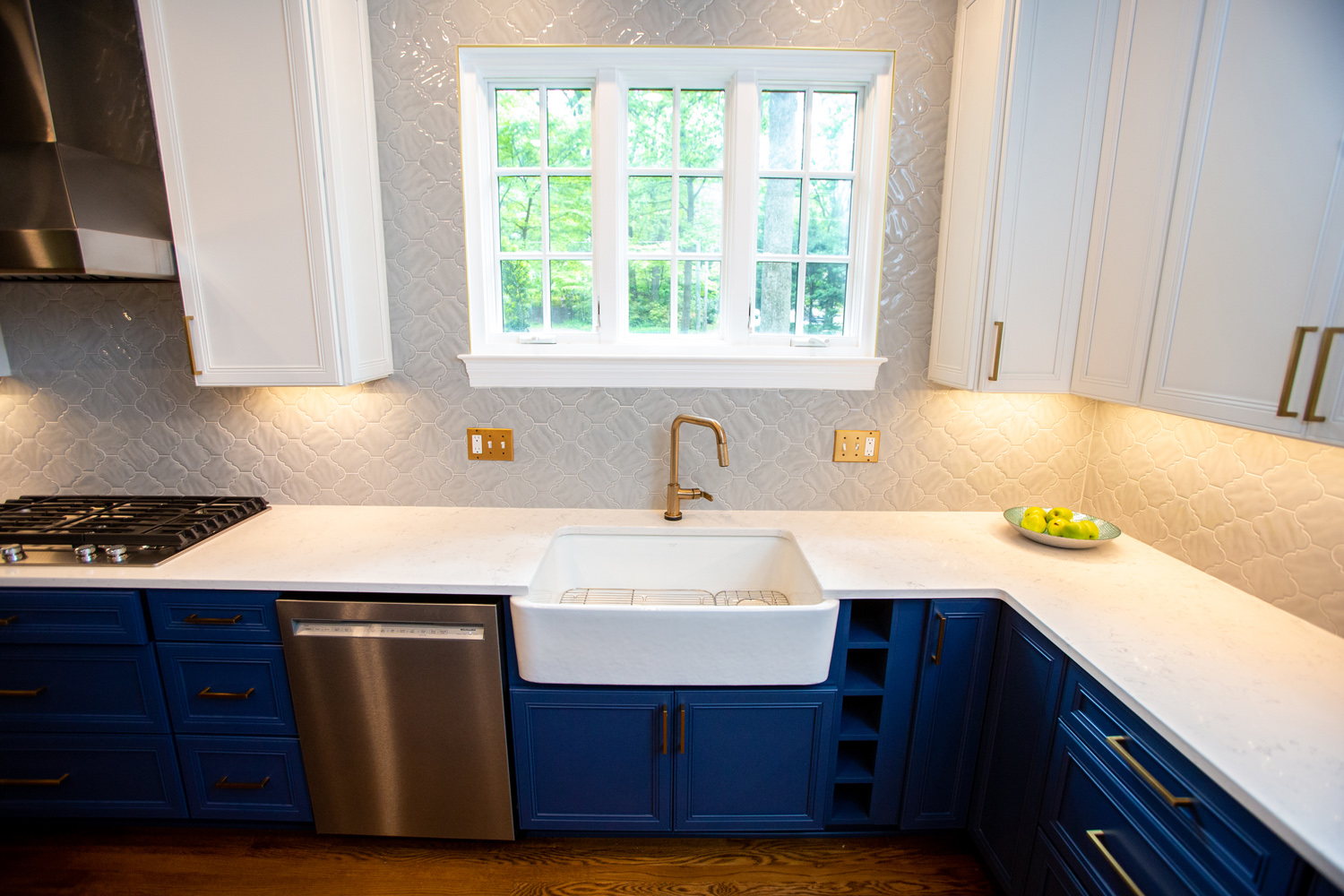There are many benefits of quartz countertops in kitchens and bathrooms, and they are among the most popular choices for people looking to embrace a high-end and elegant influence within their homes. Quartz is considered one of the most superior building materials, and it has an eye-catching beauty and durability that makes it incredibly appealing.
Quartz Countertops vs. Granite Countertops: What’s the Difference?
When deciding on a stone for home-interior surfaces, there is considerable discussion about whether granite or quartz countertops are better. Granite is a coarse-grained, purely natural stone that is polished and fabricated into countertops. Conversely, quartz is an engineered stone that is made of a combination of stone byproducts, including natural quartz and other minerals, resins, and dyes. In addition, granite requires quarrying out of the Earth, while quartz does not.
More resistant to heat, granite wins here, but quartz is harder and less porous, so it is less susceptible to cracks and keeps kitchens freer from bacteria and mold. Even though both have pros and cons, and it is truly up to the homeowners’ individual preferences, many people are opting for the quality of quartz.

The Benefits of Quartz Countertops
Quality quartz countertops have become many homeowners’ first choice, and it’s no wonder why. With its durability and antibacterial value, it is also highly desired because it is stain-resistant and easy to maintain. Being an engineered material, it has minimal imperfections and many manufacturers provide warranties upon installation. Here are some additional benefits.
Quartz Is Non-porous
One of the most significant advantages of quartz is that it is a non-porous material, which means it won’t stain or scratch like other countertop materials such as granite or marble. Quartz is also a very durable material, so it’s ideal for high-traffic areas like the kitchen.
Comes in a Wide Variety of Styles
Another big benefit of quartz is that it comes in a wide variety of stylish colors and finishes. So whether you’re looking for a traditional white countertop or something more unique, you will find many different colors that match your kitchen when you remodel.
Ease of Maintenance
Because quartz countertops are non-porous, it makes them practically maintenance-free. They are easy to clean. Simply wipe down a spill with soap and water.
Quartz is Tough and Durable
Quartz countertops are indeed one of the most durable materials on the market, making them a desirable choice for countertops. Its scratch-resistant surface can withstand heavy use, and its manufactured color is less likely to fade or stain than other materials.
Not All Quartz Material is The Same
Each slab of quartz is created using the same general process; however, brands will differentiate themselves with their selectiveness in raw materials, quality control, country of origin, and stylized colors. Caesarstone, Silestone, and Cambria are the best-known quartz countertop brands. The Globe-News Wire states that manufacturers and interior designers are propelling the market growth because they consider quartz a highly preferred engineering stone in residential and commercial spaces.
The Price of Quartz
In the U.S., most quartz slabs are imported from countries like Canada, India, Israel, Spain, Turkey, and Vietnam. Due to tariffs or taxes imposed upon imported or exported goods, many have experienced significant disruption in the countertop market. According to PR News Wire, practices dramatically shifted in 2019 as we saw quartz sourced less from China than ever before. Having been the leading source of quartz importers up to that point, China provided U.S. suppliers with materials at a much lower price than any other import source. However, due to a tremendous 200% increase in tariffs in 2018, China ceased to be the first-choice supplier of the man-made stone, and now India is the largest source of quartz slabs in the U.S.
As we mentioned in a 2018 blog titled “Are All Quartz Countertops the Same?,” Chinese-imported quartz looks very similar to other quartz products, yet the quality is starkly different. North American manufacturers closely follow trade laws, which specify the quartz-to-resin ratio and create consistent thickness and pigment coloring throughout the slab. However, due to the continued increase in the use of the attractive and sturdy stone, not all U.S. manufacturers can keep up with the production demand of quartz, and import dealers are not as strict at following standards. This is why purchasing materials from a well-researched and trusted source is imperative to ensuring best-in-class installations.
Due to its many benefits, and since more regions worldwide are providing import-worthy products, granite has taken a big step back in popularity. Yet, since this transition, the benefit comes directly to the consumer. The decline in demand means that granite slabs are more widely available and the prices of the naturally occurring material have markedly decreased. What used to present as a dramatically different cost, we now find quartz and granite at almost the same price point. Price and availability aside, most still see the benefits of investing in quartz over granite to be the preferred choice.
Installing Quartz in Your Next Home Renovation Project
Whether you’re just beginning to think about the kind of aesthetic value that stone countertops can add to your home or you’re ready to start your project discussion today, we at Northwood Construction want to help you find the best solution for your renovation project. Call us to discuss the benefits of quartz countertops and discover how we can bring your kitchen and bathroom remodeling dreams to life.
